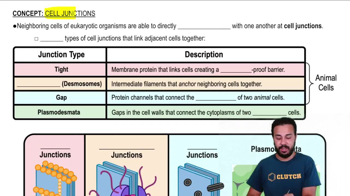Textbook Question
John sustained a severe injury during football practice and is told that he has a torn knee cartilage. Can he expect a quick, uneventful recovery? Explain your response.
630
views
 Verified step by step guidance
Verified step by step guidance Verified video answer for a similar problem:
Verified video answer for a similar problem:


 3:40m
3:40mMaster Intro to Connective Tissue with a bite sized video explanation from Bruce Bryan
Start learning